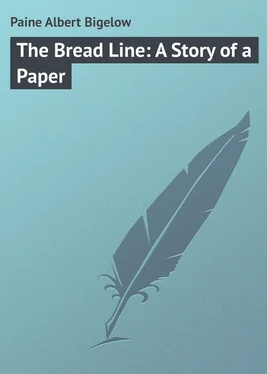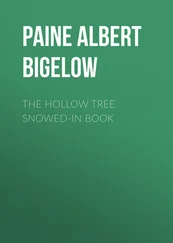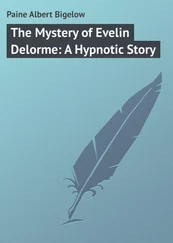Albert Paine - The Bread Line - A Story of a Paper
Здесь есть возможность читать онлайн «Albert Paine - The Bread Line - A Story of a Paper» — ознакомительный отрывок электронной книги совершенно бесплатно, а после прочтения отрывка купить полную версию. В некоторых случаях можно слушать аудио, скачать через торрент в формате fb2 и присутствует краткое содержание. Жанр: foreign_prose, на английском языке. Описание произведения, (предисловие) а так же отзывы посетителей доступны на портале библиотеки ЛибКат.
- Название:The Bread Line: A Story of a Paper
- Автор:
- Жанр:
- Год:неизвестен
- ISBN:нет данных
- Рейтинг книги:5 / 5. Голосов: 1
-
Избранное:Добавить в избранное
- Отзывы:
-
Ваша оценка:
- 100
- 1
- 2
- 3
- 4
- 5
The Bread Line: A Story of a Paper: краткое содержание, описание и аннотация
Предлагаем к чтению аннотацию, описание, краткое содержание или предисловие (зависит от того, что написал сам автор книги «The Bread Line: A Story of a Paper»). Если вы не нашли необходимую информацию о книге — напишите в комментариях, мы постараемся отыскать её.
The Bread Line: A Story of a Paper — читать онлайн ознакомительный отрывок
Ниже представлен текст книги, разбитый по страницам. Система сохранения места последней прочитанной страницы, позволяет с удобством читать онлайн бесплатно книгу «The Bread Line: A Story of a Paper», без необходимости каждый раз заново искать на чём Вы остановились. Поставьте закладку, и сможете в любой момент перейти на страницу, на которой закончили чтение.
Интервал:
Закладка:
A consideration of the first number's contents was then taken up, with the result that they were to prepare it mostly themselves. They were on familiar ground now, and Perner and Van Dorn each displayed some evidence of fitness for their respective positions. There must be two stirring serials, one of which they would buy. Barrifield knew where one could be had. Livingstone could do the pictures for this story. The other would be more in Van's line.
Then they lighted cigars and went back to the premiums, and Barrifield launched into the details of his recent explorations and discoveries in the vast jungles of Premium Land. He had examined and priced everything, from a nut-cracker to a trip abroad. Presently he began to spread a number of these things on the table, which the waiter had once more cleared. Besides the watch and Bible, there was a fishing-kit, all but the rod, which was described fully in a leaflet, a bicycle lamp, a pamphlet outlining a tour through the Holy Land, sample pages of a cook-book, and a pair of ear-muffs.
Barrifield arranged these on the cloth, explaining as he did so that a beautiful box kite had been too large to bring, as was also a gun of which he could get a limited quantity – a hundred thousand or so – at a ridiculously low figure. Van Dorn picked up the ear-muffs curiously.
"What do these cost?" he asked.
"Forty-eight cents a pair by the gross. Special inside figure because I told him we would want a quarter of a million pairs."
Van Dorn looked at them a little closer.
"The fellow I saw must have stolen his," he said, "for he was selling them yesterday on Broadway for twenty-five cents a pair."
"Impossible, Van! They couldn't be the same, you know," protested Barrifield, earnestly. "There are many qualities of ear-muffs. These are the very best-double-elastic, wire-set and-bound, storm-proof muffs. They cost forty-six cents to make – the manufacturer told me so. What you saw was a cheap imitation."
Barrifield put an end to further discussion on this point by calling attention to the bicycle lamp – something new and superior to any in use. He had been attracted by it in a sporting-goods window on Nassau Street. The price had been steep, – too steep for a premium, of course, – but he had made up his mind that if he could get on the "inside" he would find a price there within their reach. He had got on the inside. He had pursued the elusive "inside" even to Hoboken, and captured it there in the very sanctity of the factory – the president's private office.
"The president was a fine, big, smooth-faced man with one of these rich, hearty laughs," he explained, "and we had a long talk together. I told him we had a new scheme that would put us in a position to use a quarter of a million of these lamps the first year, and that we had been considering another make – which was true."
"It was," said Van Dorn, "and it would have been equally true to have said that we've been considering every known article of commerce, from a mouse-trap with two holes to a four-masted schooner."
"That caught him right away," continued Barrifield, regardless of this interruption. "He said he wanted to get started with a new thing like ours, and that he was going to let us on the inside. He had a talk with the manager, and came back and made me a net cash price of eighty-seven cents! Think of it! Eighty-seven cents for a two-dollar lamp! Given with the 'Whole Family' one year – fifty-two weeks – for one dollar and one new subscriber!"
Perner the businesslike was calculating.
"That would be two dollars we would get in all," he said, "for two subscriptions, two premiums, postage, and handling. Counting, say, seventy-five cents for the other premium, and twenty-five cents for postage and handling, we would have just thirteen cents left for our two subscriptions."
"By gad!" said Livingstone, weakly.
"But the advertising is where we come in," insisted Barrifield, eagerly. "And besides, everybody won't take lamps, either."
Van Dorn was smiling queerly.
"No," he said; "and if they did we can get them over at Cutten & Downum's for sixty-seven cents apiece. I saw them there yesterday."
"Not this lamp!" protested Barrifield. "I'll bet ten dollars it was a cheap imitation. I'll write to President Bright to-night about it. He's a fine man. He'd take some stock in the 'Whole Family' in a minute, if we'd let him. It couldn't have been this lamp!"
"Maybe not," assented Van Dorn; "but they had a big card up, saying 'Bright & Sons' Stellar, sixty-seven cents,' and the lamps looked just like this."
The others said nothing, but their confidence in Barrifield's purchasing ability had received a distinct jar. Presently Perner noticed the head waiter watching them intently. He was about to mention this when the minion walked over and spoke to Barrifield in a whisper. Barrifield grew red and began to drag the things together as the waiter moved away.
"What's the matter? What did he say, Barry?" asked Van Dorn.
At first Barrifield did not answer. Then the humor of it seized him, and he chuckled all over, growing even redder as he hid away the things.
"Come, old man, what did he say?" urged Livingstone.
Barrifield could hardly steady his voice for laughter.
"It's too good to keep," he admitted.
"Out with it, then," said Perner.
"Why," said Barrifield, "he said that they had sample-rooms up-stairs, and that it was against the rules to show samples here in the dining-room."
"Hoo-ee!" shouted Van Dorn. "That calls for something."
"By gad! yes," said Livingstone, "it does!"
It was well along in the afternoon when the friends left the place, and Perner, Van Dorn, and Livingstone returned to their apartments. They went over at first and stood for some moments before the picture of the bread line.
"Why don't you finish it, Stony?" asked Perner. "Finish it up and sell it for enough to pay your part in the 'Whole Family.'"
"Good scheme – I've thought of it," confessed Livingstone.
"Do you suppose there are any publishers in that line?" mused Van Dorn.
Livingstone laughed.
"I say, fellows, let's take a walk up Fifth Avenue and pick out the houses we're going to buy next year!"
As they turned to go, Van Dorn took up a blank piece of drawing-paper and a brush. He worked away a few moments, the others looking on. As they passed out he tacked it to the outer door with pins. Then they all faced about, and, standing abreast, read in the fading light of the hall-way:
V
A LETTER FROM MR. TRUMAN LIVINGSTONE OF NEW YORK TO MISS DOROTHY CASTLE OF CLEVELAND
My dear, dearest Dorry: When I sit down to write to you there is always so much I want to say that I never know where to begin, and in the end I seem to tell you nothing at all except that I love you, which you have heard so much I am always afraid you will grow tired of hearing it again. Then I turn cold at the thought, and rewrite the letter to leave out some of the times, but before I am done I find them all in again somewhere else; so it is no use, you see, and I generally send the first letter, after all. Then, when it is gone I want it back, though I don't know whether I want it to take out some of the times I've said it, or to put in some more that I didn't say.
"Oh, Dorry dear, I do love you, and often when I have thought of you in your beautiful home surrounded by luxury, and then remembered that I have asked you to leave it all and cast your fortunes with a chap whose fortunes depend on the whim of the public and the fancy of the art editor, it has made me feel so guilty that I have more than once put into those letters I didn't send something about letting you take it all back and not allowing you to make such a sacrifice for me, even though you are true and noble and willing.
Читать дальшеИнтервал:
Закладка:
Похожие книги на «The Bread Line: A Story of a Paper»
Представляем Вашему вниманию похожие книги на «The Bread Line: A Story of a Paper» списком для выбора. Мы отобрали схожую по названию и смыслу литературу в надежде предоставить читателям больше вариантов отыскать новые, интересные, ещё непрочитанные произведения.
Обсуждение, отзывы о книге «The Bread Line: A Story of a Paper» и просто собственные мнения читателей. Оставьте ваши комментарии, напишите, что Вы думаете о произведении, его смысле или главных героях. Укажите что конкретно понравилось, а что нет, и почему Вы так считаете.












